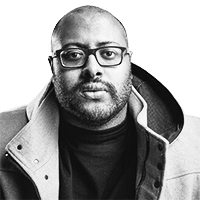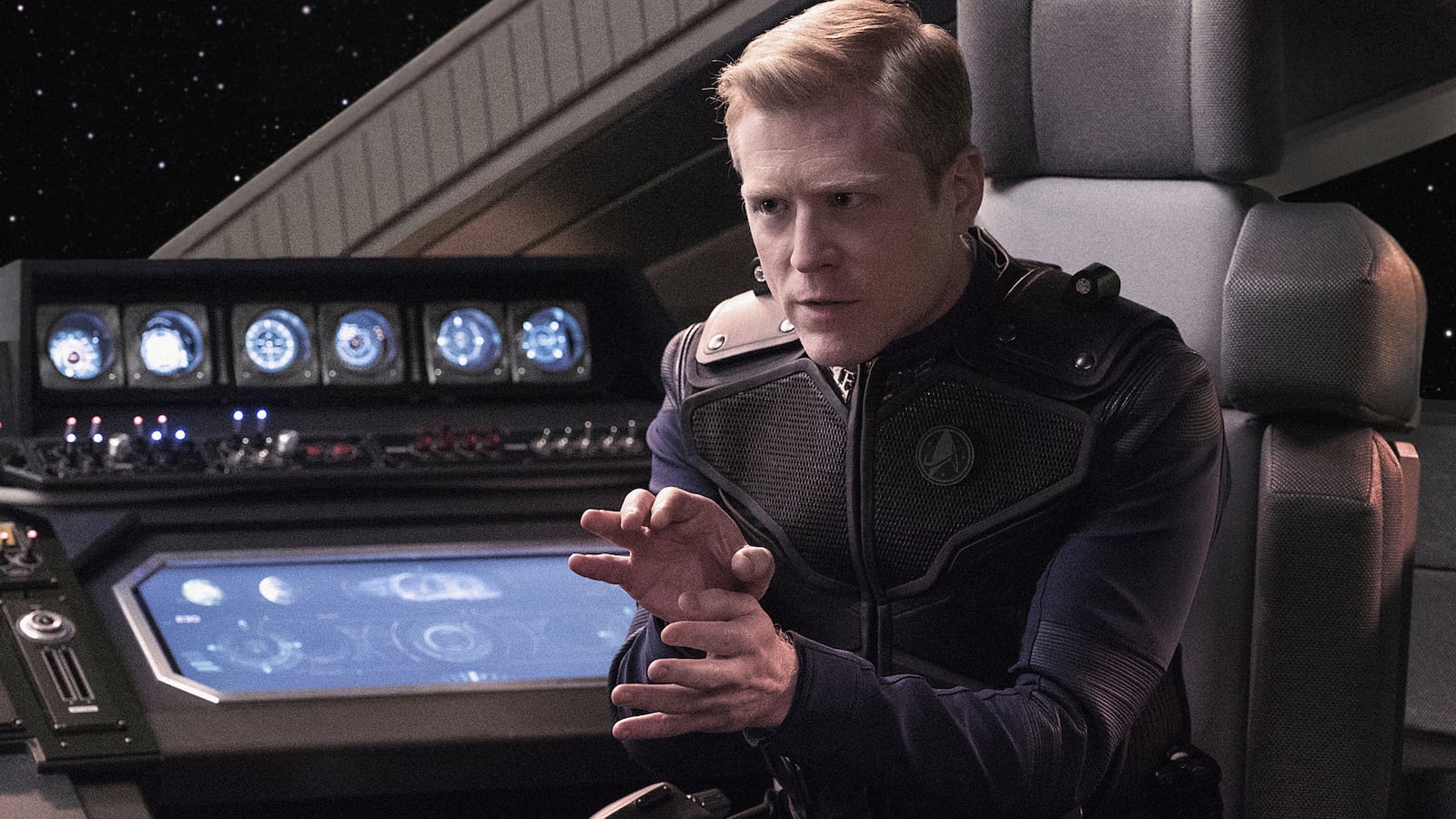Despite myriad television and film appearances during his lengthy career, the thing you remember Anthony Rapp for the most may be originating the role of Mark Cohen over 20 years ago in Jonathan Larson’s groundbreaking musical Rent. But that might be changing soon now that he’s joined one of the largest fandoms in all of pop culture: Star Trek.
On Trek’s latest television entry, CBS All Access’ Star Trek: Discovery, he portrays the franchise’s first openly gay character, Lieutenant Stamets. In a series that is breaking a lot of ground for its diverse casting—including Sonequa Martin-Green and Michelle Yeoh as leads—Rapp’s casting also stands out as one of television’s few instances where an openly gay actor is portraying a gay character.
There aren’t that many gay characters on television to begin with—and many are played by straight men—so the idea that being openly gay could play to an actor’s benefit goes against so much of what we know about discrimination in Hollywood. But for Rapp, being openly gay turned out to be a benefit in getting cast for Star Trek. “Part of what Aaron and Gretchen [Harberts and J. Berg respectively, executive producers and showrunners for Discovery] and their team was looking for, with Stamets being the first openly gay character in Star Trek TV history, was they were hoping to find an openly gay actor to play it. So it just was like one of those things where those two pieces fit together. And that was just one aspect of it. I think if they didn’t think I could do it in other respects, I wouldn’t have gotten the offer. But it was like, maybe the thing that tipped it over.”
After I watched Rapp’s first episode, last Sunday’s “Context Is for Kings,” he took a break from filming in Toronto to hop on the phone with me to discuss being out in Hollywood. Stamets is a very no-nonsense character who immediately butts heads with Martin-Green. According to Rapp, “people have to earn [Stamets’] respect and earn his affection. And I think it gives us a place to go. So I appreciate it, that was fun to get to spar with her in that way.”
We also have yet to see more of Stamets’ heart, so to speak. We have yet to see him romantically interact with his partner, Dr. Culber (Wilson Cruz). But Rapp and Cruz have a great working relationship and friendship that should translate well to the screen. “We’ve known each other for over 20 years so we have an ease and familiarity with one another and a longstanding friendship and respect,” Rapp said of Cruz. “So it was a matter of building off of that kind of camaraderie and friendship. I have tremendous respect for him as a human being, as an actor, as an activist. So yeah, I was delighted when he was cast because this makes part of my job really easy. I haven’t really played long-term relationships a lot [in my work]. So you have to build a rapport and that can not always go great, depending. The ideal is that everyone becomes friends and you get along well.”
From there, we launched into a conversation on being gay in Hollywood and where we still have to go in terms of queer representation.
Has it been easy to be out for most of your career?
In some cases it just so happens where actors are advised by their representatives to be closeted. They’re afraid that it will ruin their careers and they won’t get work. It’s never been the case for me, as far as I know. I suppose it may be that it has been the case and there have been roles that I haven’t got. Because I’ve been out publicly for, like, I think it’s 24 years or something like that.
That’s a long time.
Yeah, so it’s very possible! I don’t know. No one’s ever said it—it’s never gotten back to me. I suppose they probably wouldn’t have told my agents; they’d have sounded like assholes. I’ve done films for 30 years, and some of that time I was out. So you know, again, I don’t know if it’s been a factor. I think in theater it hadn’t ever been a factor, for sure. It may or may not have been a factor over the years in film and television, but I just have no way of knowing for certain.
Star Trek has always had a reputation for being progressive since its debut. Is that happening organically on the show or is it a concerted effort?
Well, I think that the writers and producers knew they were going to cast a black woman as the lead and that’s not just virtue signaling. It’s game-changing to have a black woman in the lead, and those facts are not a factor in the Star Trek universe. In the world of Star Trek, the fact that she’s female, the fact that she’s non-Caucasian, has no effect on how anyone in Starfleet treats her. What matters is what you do and what you say. That’s the aspect of the vision of the future that is more utopian—that these divisions, these silly divisions between people on Earth, have pretty much melted away. And no one’s really concerned anymore with where you come from, or what your ethnic heritage is, or what your gender is. Or in the case of Stamets, what your sexual orientation is. All of that is sort of settled and then it’s just a matter of: are you a good person or are you a bad person? Are you good at your job or bad at your job? Do you do things that send the Federation into war or not? We’re all very mindful and celebratory of that. You have to make a conscious effort to do this, because you have to balance out years and years and years of sameness in depictions. So yeah, it’s something that we’re very proud of.
Have there been depictions in media that inspired you along the way, or have you been more focused on trailblazing yourself since you’ve been out for so long?
I grew up in theater so I was around a lot of diversity and a lot of freedom of expression. So I think that when I look back, I don’t really remember ever really being aware of these things as labels. You know, it’s hard for me to look back and go, “Oh yeah!” because it’s just sort of how it was, it was the fabric of my life. I was more influenced by the people I was directly working with, who were kind of role models to me in the workplace or in conversations we’d have before or after work. I mean, I’ve heard so many stories of people though over the years who have looked to different people and seen themselves and how much of a difference that makes. And that’s profound. Visibility is hugely important to me and that’s part of the reason that I came out 24 years ago. I really believed that visibility is important. It’s much easier for people to denigrate or marginalize that which is unseen, that which is unknown, than it is to look another human being in the eye and say, “I’m going to condemn you.”
Do you feel like we’re moving forward in terms of queer representation?
I think we’re definitely moving forward, but there’s progress to be made. It’s never-ending. Certainly the new frontier where boundaries have to be pushed is in the transgender community, and our depictions of the transgender community. That’s probably the biggest next step to take. I mean, one of the things that is true of Rent, as well as of Discovery, is in Rent no one’s talking about anyone’s race; no one is talking about anyone’s sexuality. The only factor that anyone’s ever really talking about is HIV status and everything else is what it is. So there’s no issue made of that. People aren’t struggling with their identity in that way, and that’s not to say that people of course in life aren’t still struggling with their identity. At the same time, I think it’s valuable to hold up these beacons and show this is what it can be like. You can have all these people of such diverse backgrounds together creating a community, creating a family, working together, supporting one another. And that’s not simply idealistic. It also can be realistic.
What role do you think the arts play now in this political climate?
I think the arts are often on the vanguard of socio-political discourse and are often among the first lines of offense in creating change. It can take a while for things to filter down into the bureaucracy, but they’re part of what alters the conversation. And I do believe that things like Rent, people like Ellen DeGeneres, Elton John, all the pop stars that have come out—I think that over the last 20-plus years, that has absolutely been a huge part of what has shifted young people’s attitudes around homo and bisexuality. So it’s part of the art that’s been created and also part of the public figures themselves who have used their platforms to speak about these things. But to me, it’s undeniable that all of that put together in this big stew has been part of why numbers of young people have no issue with homosexuality or bisexuality or any spectrum of queerness. I do think that in in a time when there’s even more noisy divides, that the arts can be a huge part of what keeps the conversation moving forward.





